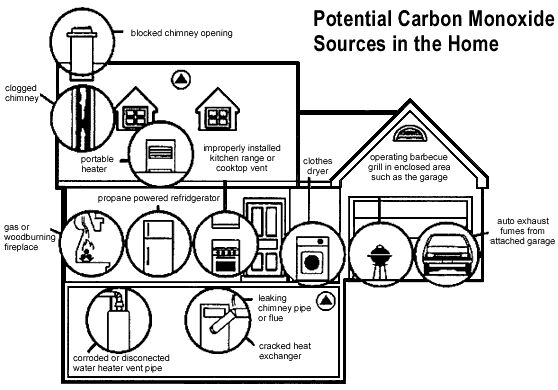#CarbonMonoxide
With New Technology Comes New Ways to Die
Since 2005, 37 deaths by carbon monoxide poisoning have been attributed to vehicles with keyless ignitions that were inadvertently left running. Automatic engine shutoff is not currently mandated by the National Highway Traffic Safety Administration, so manufacturer’s application of the technology is sporadic. But the PARK IT Act wants to change that.
Safety Group Leans on Ford to Recall 1.3 Million Explorers
After receiving negative attention from various policing agencies over a potential carbon monoxide leak in Explorer-based Interceptor Utility vehicles, Ford is being urged by the Center for Auto Safety to recall over a million vehicles. While the automaker hasn’t yet done so, it hasn’t been sitting on its hands, either. The automaker issued technical service bulletins to service centers, dispatched its own investigative teams to examine police fleets, and said it would work with the National Highway Traffic Safety Administration as the agency conducted a probe of its own.
Ultimately, Ford said the vehicles were safe — attributing the claimed monoxide leaks to aftermarket modifications common on police vehicles. However, it also agreed to examine and repair any Explorer (for civilian or official use) in the hopes of reassuring worried owners. Meanwhile, customer complaints ballooned after news of the story broke.
In July of 2016, the NHTSA had fewer than 200 Explorer-related grievances on file. The Center for Auto Safety claims that number has now grown to 1,400.
Police Officers Suing Ford Over Alleged Carbon Monoxide Poisoning in Interceptor SUVs [UPDATED]
Two Austin-based police officers have filed lawsuits against Ford Motor Company after being incapacitated by carbon monoxide that leaked into the cabin of their Interceptor Utilities. Ford finds itself flooded with hundreds of complaints over unacceptable carbon monoxide levels in 2011-2017 Ford Explorers, receiving the most flack from police departments with problematic SUVs. Officers across America have complained of dizziness while driving, with some requiring hospitalization.
The issue had become so bad that Austin’s police department actually pulled about 400 Explorer-based squad cars from its motor pool. Scrambling for a solution, Ford has implemented a special task force to investigate the problem and develop a solution. The automaker also offered to fix 1.33 million Explorers to ensure there is no exhaust leak, but was quick to remind everyone this wasn’t a recall, as no U.S. government standard for in-vehicle carbon monoxide levels exists.
Ford Identifies Source of Dangerous Carbon Monoxide Leak in Police Vehicles
Ford has assembled five squads of investigators to help police departments cope with the growing number of reports of exhaust fumes incapacitating on-duty officers in Explorer-based Interceptor Utility vehicles. While the problem appears to exist in civilian spec SUVs as well, police vehicles are getting the most attention from Ford and the press, especially after the National Highway Traffic Safety Administration cited three wrecked patrol vehicles and numerous drivers looking green in the gills.
The NHTSA ramped up its engineering analysis since then, which could lead to a recall on all Explorer-based models from 2011 to 2017. But Ford hopes to get out ahead of the issue by making good on an earlier promise, dispatching its own investigative teams to ensure police departments don’t look to other automakers the next time they need to replenish their fleets.
According to Ford, it’s already making headway in solving the problem.
NHTSA Expands Ford Explorer Probe After Probable Police Gassings
The U.S. National Highway Traffic Safety Administration is inching its way toward what could be a massive recall of Ford Explorers. An initial probe kicked off in 2016 after owners entered numerous complaints of an unpleasant exhaust smell in the cabin into the NHTSA database.
Formal grievances swelled into the hundreds by the end of the year and continued growing into 2017. The issue was so serious, one California police officer faulted it for overpowering him while behind the wheel of his Explorer-based Interceptor Utility, resulting in a crash last February. He wasn’t alone. On Thursday, the NHTSA announced at least three other wrecks could be attributed to carbon monoxide exposure inside the vehicle. All in all, the agency stated it is aware of 41 injuries and over 2,700 complaints linked to the issue.
While the injuries are mostly instances of nausea, severe headache, and dizziness, those symptoms pose a serious risk while driving. Concerned the problem could result in another crash, the NHTSA has broadened the probe to encompasses 1.33 million vehicles from 2011 to 2017 and upgraded it to a complete engineering analysis.
Dizzying Number of Exhaust-in-cabin Reports Plague Ford's Explorer
After the National Highway Transportation Safety Administration launched an investigation into reports of a sulphurous exhaust smell in the cabins of 2011-2015 Ford Explorers, numerous complaints have rolled in concerning newer models.
Now, a California police officer claims the exhaust led him and his patrol vehicle on a date with a tree.
Killer Keyless Ignition?
Toyota’s legal problems are piling up. It is now being alleged that they killed a lawyer. The New York Daily News reports that 79-year-old lawyer Ernest Codelia Jr died of carbon monoxide poisoning and his partner, Mary Rivera was brain damaged. And their Lexus is being blamed. How come?


![Police Officers Suing Ford Over Alleged Carbon Monoxide Poisoning in Interceptor SUVs [UPDATED]](https://cdn-fastly.thetruthaboutcars.com/media/2022/07/19/9201747/police-officers-suing-ford-over-alleged-carbon-monoxide-poisoning-in-interceptor-suvs.jpg?size=720x845&nocrop=1)















Recent Comments